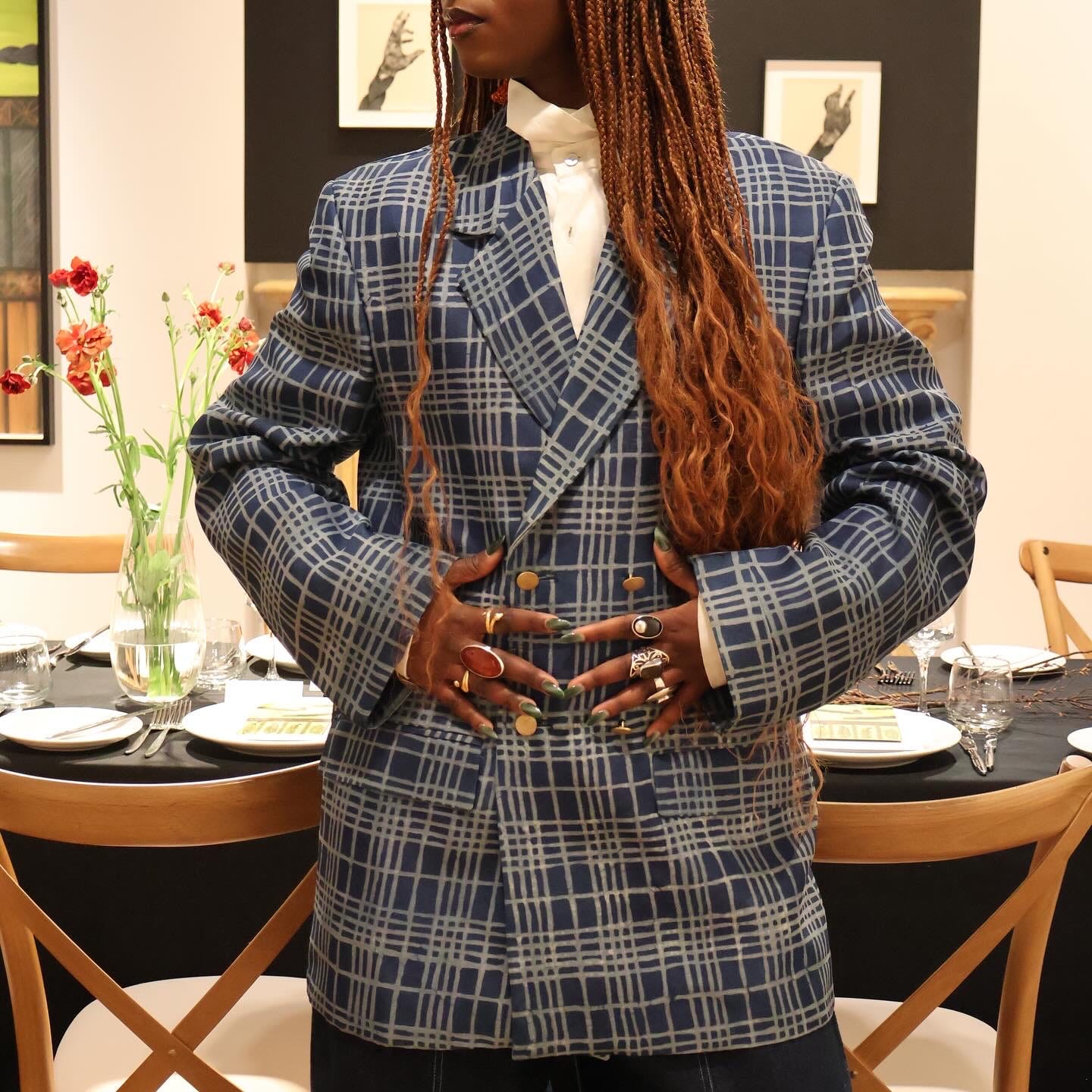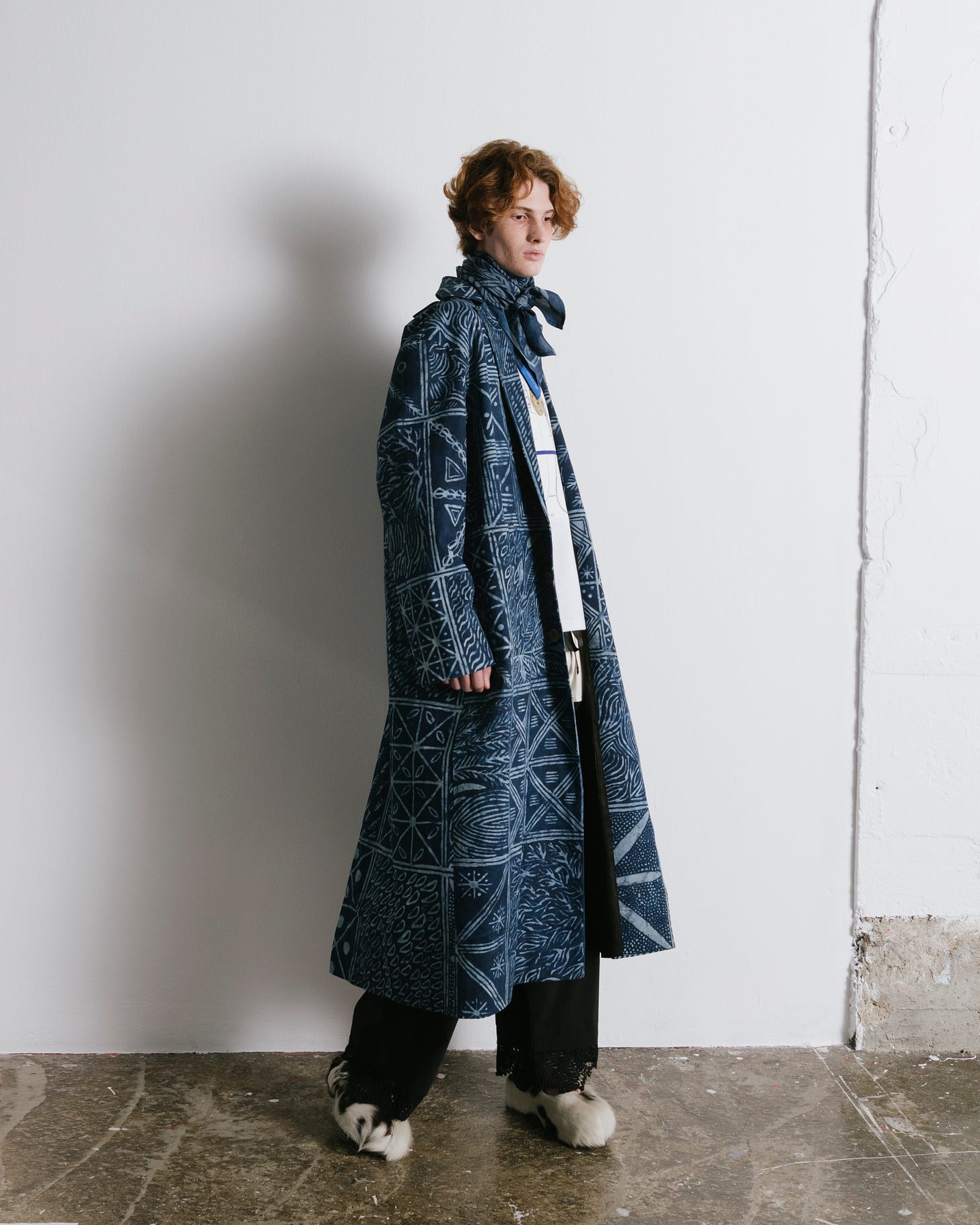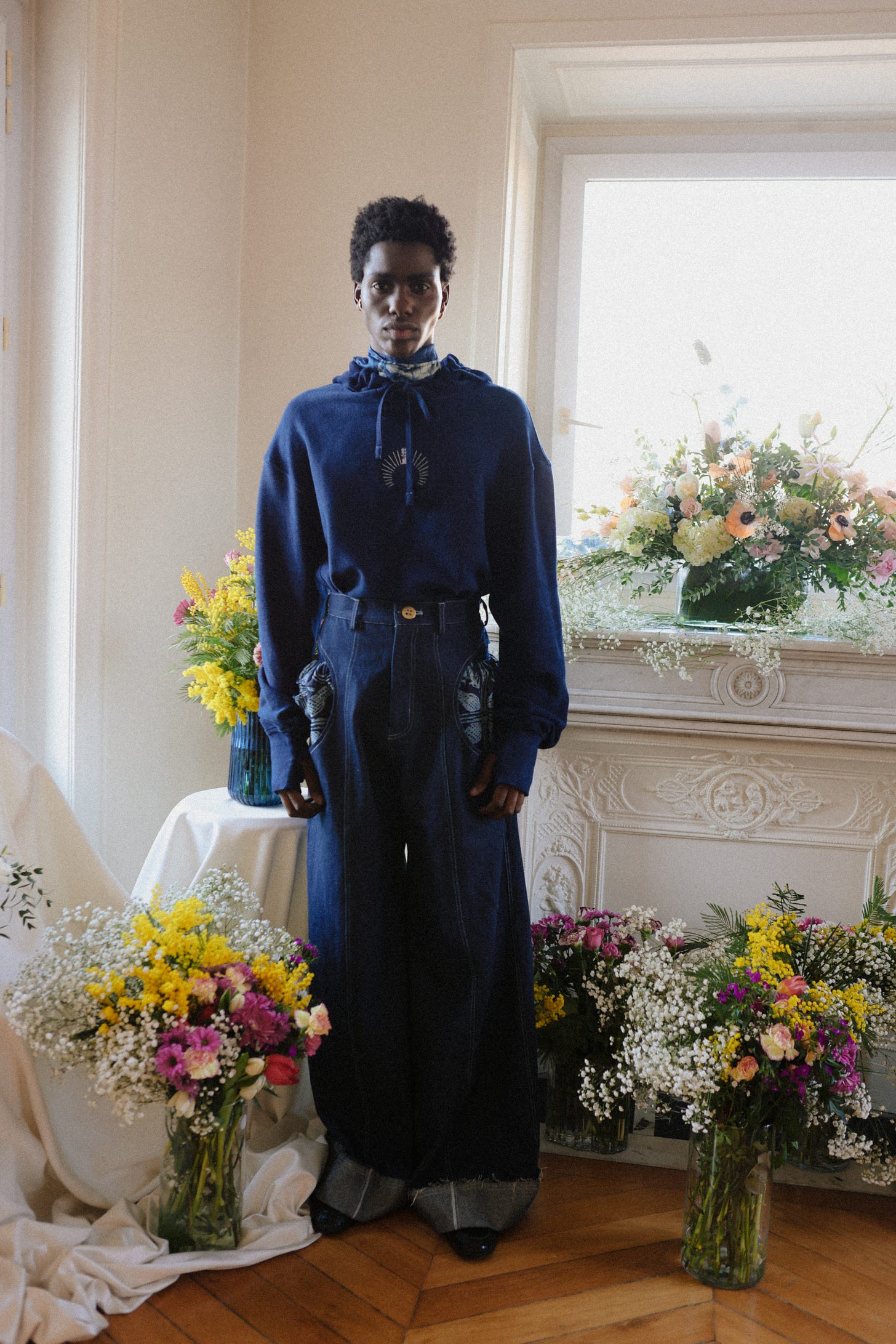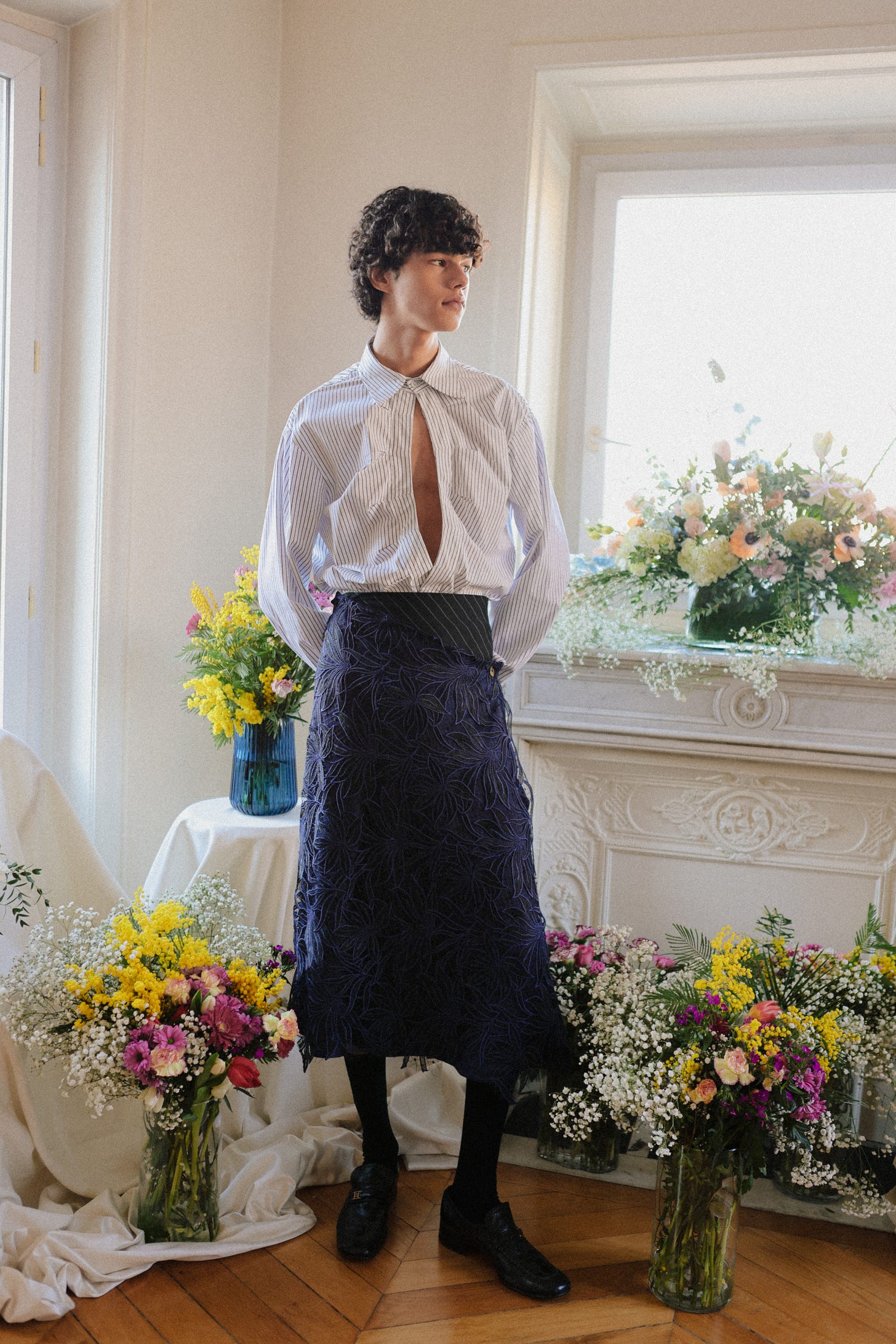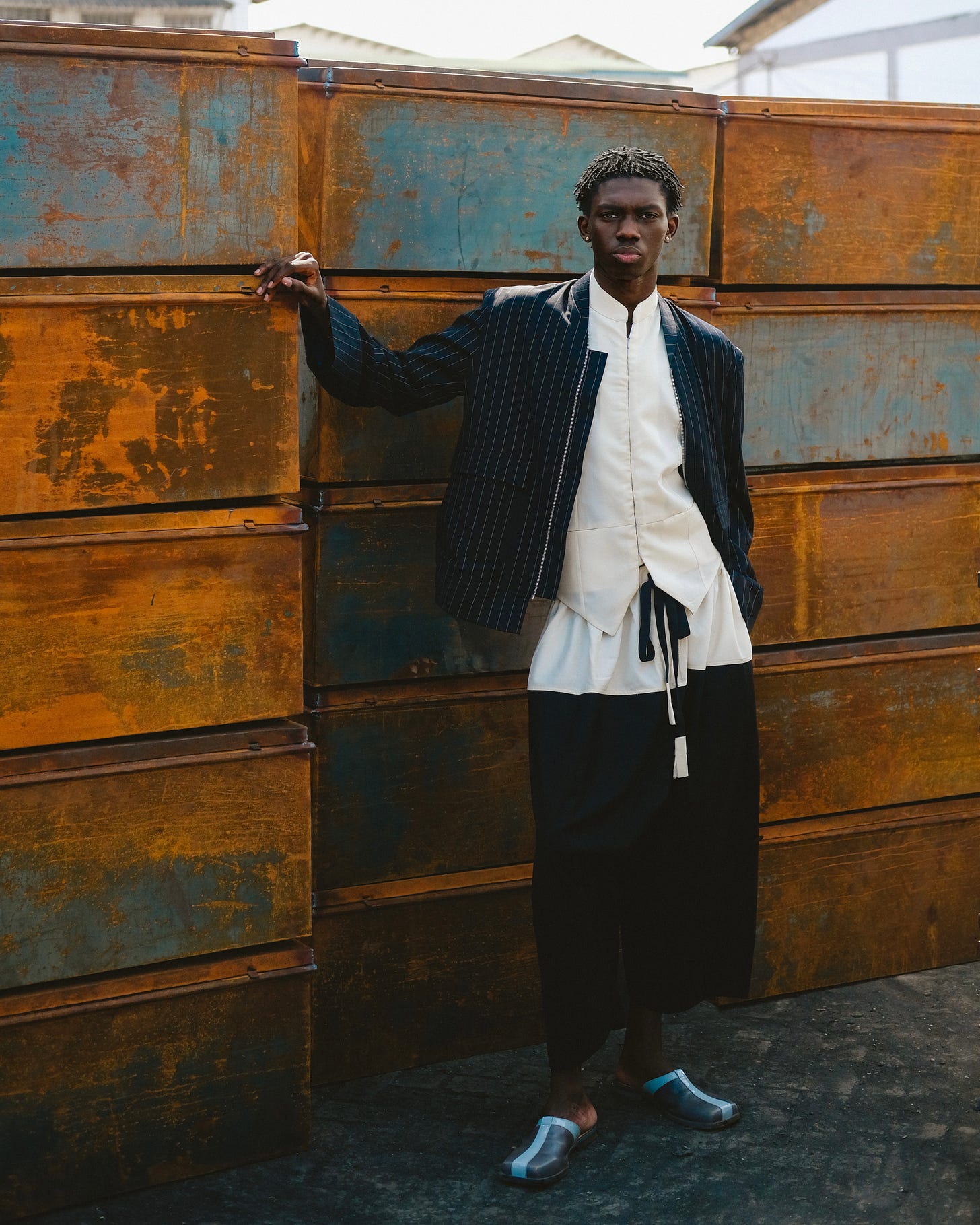3. Adeju Thompson
On erasure, endurance, and expanding the industry’s imagination.
Adeju Thompson, of @lagosspaceprogramme
https://www.lagosspaceprogramme.com/
I can pinpoint the first time Lagos Space Programme entered my universe with absolute clarity. It was approaching the end of the Paris AW24 season, that last stretch of fashion week when everything can feel sharp-edged, airless, taut yet Adeju’s PR in Paris, the inimitable David Siwicki, insisted I see LSP’s show. And he was right.
Stepping into the Left Bank apartment where Adeju was showing, I had the sense of arriving somewhere entirely its own; a beauty that felt newly possible; spectral histories gathered in the room. I still think today about this one-and-a half breasted jacket, hand-dyed and painted with a tweed motif according to the Yoruba technique of adire, completed with Benin bronze buttons.
The collection in question was entitled Invitation to Ojude Oba which I had the joy to write about for AnOther: “each look was an elegant, gender-fluid proposition of an ongoing dialogue between Nigerian and British fashion heritages within a decolonised space—neither took precedent over the other.”
Since, Adeju is someone I have deliberately kept in my orbit. For speaking with him is like sitting at the edge of a tide: every sentence arrives textured, tensile, surprising. His mind moves the way indigo disperses through water—slow at first, then suddenly expansive, colouring everything it touches. There is no wasted syllable; the intelligence runs deep, and the integrity runs deeper.
Reading our conversation below, I think you’ll feel it too. Adeju doesn’t turn away from the realities of the industry—its erasures, its blind spots, its exhausting demands—but he meets them with a woven, deliberate clarity. He reminds me that fashion can still be a site of research, rigor, generosity, and truth. That creativity, when held with care, can become a form of resistance.
Finding My Voice, Finding My Way
Fashion’s always been innate for me. My earliest memories are of drawing clothes—fashion drawings, even as a kid. It was just something that came naturally, something I found exciting. I went to fashion school in the UK for a year, but when my grandfather—who was like a father to me—passed away, I couldn’t continue. I had to move back to Nigeria.
But I didn’t come back defeated. I felt equipped. I’d done a foundation year in art and design, and it gave me tools—ways of thinking critically. I was beginning to look back home for inspiration, trying to understand Nigerian culture, design, style from a new place. It was exciting. I showed my portfolio to a few local designers, and they were interested, but no one wanted to pay me. So I thought, fine. I’ll figure it out myself.
That became my path: to understand and cement my point of view. That was always the mission. I wanted to be the best designer I could possibly be. And when you’re good, you get attention. People started noticing. I found a sales agent who told me, “You should be in Paris.” I hadn’t considered it before, but at the time, designers like Kenneth Ize were in Paris, Amaka Osakwe of Maki Oh was showing in New York, so I thought—why not?
We applied to the women’s calendar and didn’t get in, but they said the work was really strong and encouraged us to apply for menswear. Around the same time, I applied for the Woolmark Prize—and I won. That changed everything. Suddenly I was “hot.” I showed in Paris. But looking back now, I laugh. I had no network, no foundation. I was in the most competitive fashion capital in the world, with no team, no contacts, just a strong collection and pure intention.
If I could go back, I would’ve done things differently. I would have grown more organically, built community, stayed rooted. But back then, I didn’t know what I didn’t know. I thought, this is where great design is recognised, so this must be the way.
On Being “Too African”
Paris was hard. Really hard. I had to build everything from scratch. And beyond the logistics, I constantly faced this quiet wall of doubt, of erasure. There was one editor who met with me—respected, established. I spoke to her about my Invitation to Ojude Oba AW24 collection, the politics, the cultural references. She just didn’t get it. It was like: why is a Nigerian designer referencing the Prince of Wales? But that’s colonial history. That’s how culture works. Japanese designers are allowed to collage references and be complex. African designers are expected to stay in their box.
There was one buyer who said to my agent that Lagos Space Programme was “too African.” What does that even mean? The collection she was referring to was shot at the Osun-Osogbo Sacred Grove—an ancient, deeply spiritual space. It’s a living archive. That’s not “too African.” That’s punk. That’s history, philosophy, futurism, all at once. But people don’t see that. They see “Africa” and they expect lions and wax print.
My work draws from deep Nigerian traditions—but I push it somewhere else. My clothes are minimalist, experimental, often called “Belgian” in spirit. People are always surprised when they see them in person. Then it’s like, “Oh wow, this is really conceptual, really refined.” And I’m like—yes. I know. This is my food. This is where I live.
There was even a stylist from Dazed who complimented my stylist at the show and wouldn’t even look me in the face. As if I hadn’t made the collection myself. Like I was just a body standing there. It was humiliating. And that wasn’t an isolated experience.
I had to fight for people to even see me. I started physically pulling buyers back into the showroom. Dressing models in front of them. Explaining every detail. Only then would they start to engage. That level of labour just to be seen as valid? It wears you down.
And still—after all that—some wouldn’t buy. They’d say it didn’t fit the market. Or that they’d already bought one African designer recently. One. As if there’s only room for one.
Community, Confidence & Starting Again
All of this has made me rethink everything. I didn’t have the right community. I’ve always been a bit of an outsider—socially, emotionally. I’m not the girl at the rave. I’m not out at parties. I’m in the studio. I’m a reader. A researcher. A nerd. Lagos Space Programme didn’t grow around a scene or a tribe—it was just me, trying to build something alone. And in Paris, if you don’t have a tribe, you fall flat.
But I’m also realising: I can start again.
Winning the Woolmark Prize gave me $130,000 (USD). I spent it wrong. I thought I had to show. I thought I had to perform. But now I know better. If I’d used that money to build infrastructure in Nigeria, to deepen my community, to expand the world of Lagos Space Programme locally—we’d be in a different place. I think about my friend Bubu Ogisi (of IAMISIGO) —her work, her shows, her world. People show up for her. She didn’t chase Paris. She made her own rules. I admire that so deeply.
Now I’m trying to build something slower, more intentional. I’ve been working on a new plan, and there’s interest from people who believe in what I’m building. But I’m cautious. I don’t want to be pushed back into Paris before I’ve built a foundation. Not spectacle. Not another expensive cycle of shows without real roots. I want to do this differently this time—sustainably, truthfully, at my own pace.
That’s why I’ve applied for The Hodder Fellowship at Princeton. It’s a year-long research position with the freedom to travel and build. My proposal is a documentary on adire, the Yoruba indigo dye tradition. It doesn’t exist yet, and I want to make that history visible. And that’s not a side project—that’s Lagos Space Programme too. Research, memory, theory—they’re all part of the brand.
Because my work has always been a cultural consideration. That’s what I said in my first ever interview. I didn’t get into this for vibes. I’m not here to be sexy. I’m here to build something rigorous, something real.
Reclaiming Control
Right now, I want to show one collection a year. That’s what works for me. The strongest collections I’ve made are the ones I had time to build. Where I could sit with the ideas. The ones I rushed? I knew they weren’t right, even if people said they loved them.
And I want to be unapologetically African. I want to create activations. I want to host conversations. I want people to understand what LSP is. I want to sell to people who feel the clothes. Because the people who buy them love them. They just don’t always post on Instagram. That’s OK. But I need to tell the story better. Create context. Build bridges.
Someone once told me to dumb it down. To post less intellectual things. That broke my heart. Because I’m proud of how I think. I’m proud that I can articulate my work. That I’ve read the books. That I can place my clothes in a broader conversation. I’m not going to shrink myself to fit someone else’s feed. If the industry can’t hold that—it’s the industry that needs to expand.
I’ve had moments where I wondered: should I stop being “African”? Should I edit that out? But the truth is, I’m proud. I’m Nigerian. My work is Nigerian. And I want to show that Nigerian design can be conceptual. It can be rigorous. It can be weird. It can be romantic. It can be soft. It can be everything.
Now I finally feel confident enough to say no. No to rushing. No to minimising. No to playing a game I didn’t sign up for. What I want is to grow this project—slowly, sustainably, truthfully. Maybe Paris again one day. But only when it makes sense for me.
Adeju’s words to live by: authenticity over approval.
(I try to live by the idea that creativity is an act of reclamation, a means to restore, reframe, and remember. For me, the goal is to make work that feels truthful, that honours where I come from, and that contributes something lasting to the cultural landscape.)
Pass it on—3 creatives Adeju thinks are worth our attention:
Lukhanyo Mdingi: whose work carries a deep sense of human integrity @lukhanyomdingi
Sindiso Khumalo: who brings archival South African narratives into contemporary fashion beautifully @sindisokhumalo
TJ Who: whose design language feels quietly powerful and rooted in modern craftsmanship @tjwho
Thank you, dear Adeju, for sharing your wild intelligence, your history, your culture in compact dreams that ask us to stand more truthfully in our place on this earth.
Thread by thread, these voices are reweaving what fashion can mean across cultures—binding us, artfully, into a global fabric of care. If you enjoyed this interview, consider subscribing—or buy me a coffee—to support more conversations like this.


